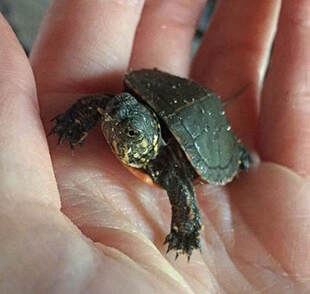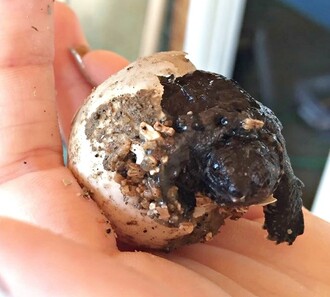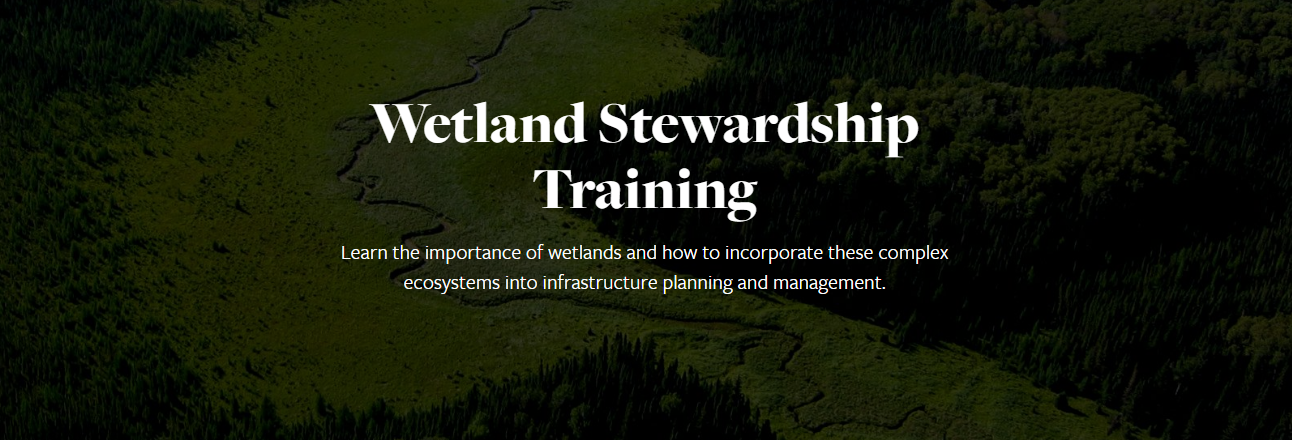|
by Heather Kerrison Late May and early June represent an important time of the year for turtles in Ontario as it is the peak of nesting season. This means that they leave the safety of the wetlands, creeks, and rivers they call home in search of appropriate nesting sites. In Southern Ontario, no area of land is further than 1.5 km from a roadway which means that this can be a dangerous time for the turtles and the eggs they plan to lay. The biggest threats to the survival of Ontario turtles are roadways and habitat loss. Reptiles, including turtles, account for a large portion of the wildlife killed on Ontario roads annually. Turtles in particular often lay their eggs on the soft substrate found along roads, making it more likely for them to be struck while crossing. A positive of reduced traffic and physical distancing is that they may have a better chance of crossing safely this season. Midland painted turtle hatchling (left), and snapping turtle hatchling (right). Turtles are slow to reach sexual maturity and only have the chance to lay eggs once a year, with those eggs facing ample threat from predation from animals like raccoons and foxes. Losing just one mature adult can significantly impact a population. Ontario has 8 species of turtles; until 2018, the midland painted turtle was the only Ontario turtle species to not yet be listed as a species at risk. When the Committee of Endangered Wildlife in Canada (COSEWIC) designated the species as Special Concern, this made eight Ontario turtle species at risk. This means that all species are at risk if active conservation and protection measure are not put in place immediately. Concerned citizens and wildlife lovers alike can help make sure that Ontario's turtles safely lay their eggs and make it back to their respective homes. Simply driving with caution during this time of year and paying particular attention to wildlife crossing signs is important. Further, if you see a turtle on a roadway, you can help it cross. It is very important that you always help a turtle across in the direction that they are traveling. They know where they are heading and if you turn them around, they will simply attempt to cross the road the same way again. Some Important Tips for Helping Turtles:
If you find an injured turtle that has already been struck, refer to this Ontario Turtle Conservation Centre page on how to get it to help. It is important to note that even if a female turtle has been struck and may not survive, the eggs she is carrying can be saved and incubated at a care facility. This ensures the young have a chance to hatch and grow the population of the species. Although the Ontario Turtle Conservation Centre is based in Peterborough, they have over thirty turtle response centres and hundreds of volunteers across Ontario who can organize a transfer to their hospital. Turtles are a precious part of our ecosystems here in Ontario and we can all take steps to help protect them.
2 Comments
by Monica Seidel While we are all practicing physical distancing, many organizations are offering free professional development opportunities. These certificates and webinars are great tools to constantly update your resume and set of marketable skills even if you are underemployed, unemployed, or looking for something to do in your spare time. Here are 6 environmentally themed professional development opportunities that you can start today: 1. Become a more confident birder with the Cornell Lab The Cornell Lab of Ornithology is a leader in bird conservation, research, and education focused on birds. They offer many citizen science programs such as Project FeederWatch and eBird. The course “eBird Essentials” provides participants with a background in the largest biological citizen-science program in the world, eBird. The course helps users learn how to fully use eBird’s features and share their sightings. By using the coupon code “NewBirder100”, you can enroll for free in their online course “Be a Better Birder 1: Size and Shape”. This course will provide basics to transform your birding skills, featuring 6 lessons, 4 interactives, and 8 quizzes. 2. Learn about Canada’s wetlands with Ducks Unlimited Ducks Unlimited’s mission to conserve wetlands and waterfowl requires collaboration among all who live and work in the boreal. Their "Wetlands 101" online course is being offered for free until June 30, 2020 and will guide participants as they learn the importance of wetlands and how to incorporate these complex ecosystems into infrastructure planning and management. The course is a self-study and focuses on wetland types, characteristics, functions and values, classifying boreal wetlands and explores practical examples. Ducks Unlimited's "Wetlands 101" course provides participants with an introduction to Canada's wetlands and explore examples. Photo: Ducks Unlimited. 3. Help grow compassionate young leaders with Jane Goodall The Jane Goodall Institute promotes understanding and protection of great apes and their habitat and inspires action by young people of all ages to help animals, other people and to protect the world we all share. Through their Roots & Shoots program, the Institute offers the Growing Compassionate Young Leaders course, a free professional development course hosted on Coursera. Participants learn how to identify and implement a local service-learning project. This course is useful for those in the education and outreach field, and those looking to host service projects and citizen science projects in their community. 4. Become a National Geographic Certified Educator The National Geographic Society is a global non-profit organization committed to exploring and protecting our planet. They offer six different free online courses throughout the year which usually run for about 6-8 weeks at a time. These courses are focused on learning more about topics like service learning, or plastic pollution, and developing ways to teach these topics. They also offer a general Educator Certification which is a great addition to any resume for those pursuing a career in teaching, environmental outreach and education, marketing, and communications. 5. Build your portfolio by contributing to the Canadian Geographic’s “Online Classroom” The Canadian Geographic Society is a magazine published by The Royal Canadian Geographic Society. Their newly launched Online Classroom is providing resources for parents and educators that are teaching from home. Their Classroom is open-source, meaning scientists, teachers, and experts in their fields can submit activities and lesson plans that teachers and educators can use right away with their students learning at home. Contact Michelle Chaput for more information on contributing to the Classroom. The Canadian Geographic's newly launched Online Classroom provides educators with lesson plans and resources for teaching at home. Photo: Canadian Geographic. 6. Learn how to identify butterflies and organize BioBlitzes The Credit Valley Conservation is a community-based environmental organization, dedicated to protecting, restoring and managing the natural resources of the Credit River Watershed. Their second annual Butterfly Blitz is a summer-long citizen science program looking to create a watershed-wide inventory of butterflies in the Credit River Watershed. Individuals learn how to identify different butterfly species in their neighbourhoods and backyards and contribute important data to the program. This year’s training will be provided online for free. Learn how to use iNaturalist, how to identify butterflies, and how to organize timed BioBlitz events in your community. Register for free here to attend one, two, or all three webinars. *** There are always ways to keep learning and brush up on your hard skills. Online courses can give some structure to your day and can also lead to networking opportunities. Until we can safely explore nature together, these 6 opportunities are great options during this time of physical distancing. Make sure to share this post with your friends and colleagues who might benefit from these free professional development opportunities: el4biodiversity.com/blog/professional-development-2020
|
ELB MembersBlogs are written by ELB members who want to share their stories about Ontario's biodiversity. Archives
January 2023
Categories
All
|







 RSS Feed
RSS Feed